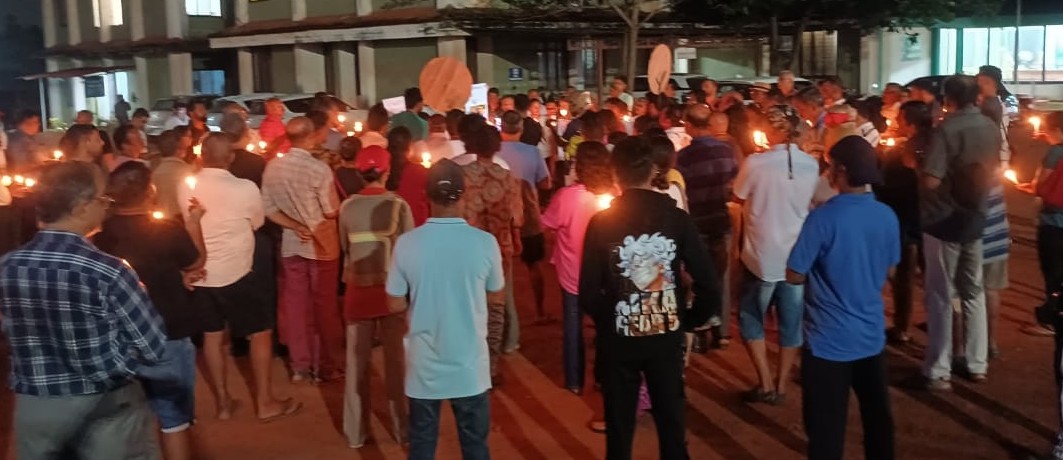Usually overwhelming noise notably subdued during weekend

PEOPLE’S POWER: Villagers held a candlelight march in front of the Anjuna Police Station on Sunday evening to protest against loud music.
MAPUSA
The Independence Day’s weekend candlelight protest in Anjuna has indeed created “sound waves” across Goa, highlighting the power of collective action in confronting entrenched issues like noise pollution.
The usually overwhelming noise – incessant loud music emanating from clubs and restaurants along the Anjuna-Vagator coastal belt – was notably subdued during the weekend, but the problem is far from resolved.
The impact of collective action: The four-day silent march, beginning on August 15, brought together villagers from Anjuna and neighbouring areas, all united against the relentless noise pollution that disrupts their daily lives.
The presence of such a large and determined group of protestors undoubtedly influenced the club and restaurant owners, who temporarily turned down the volume, a move acknowledged by many residents.
However, as locals like Dr Inacio Fernandes of Anjuna observed, while the noise levels did drop, they still spiked in the early hours, indicating that the root issue persists.
“Many people not only from Anjuna but other surrounding villages came out and joined the march (protest). In the past three days the noise level reduced drastically but it picked up in the wee hours at around 2 or 3 am,” Fernandes said.
The protest also highlighted the broader problem of illegal activities by these establishments.
According to Jawish Moniz of Vagator, the demonstration served as a wake-up call, albeit a temporary one, forcing businesses to curb their usual practices over the holiday weekend. “With the people’s protest the music had softened this Independence Day weekend. Otherwise it was like a nightmare,” Moniz shared.
The residents from surrounding villages like Assagao, Siolim and even Calangute joined the candlelight march, signaling widespread frustration beyond Anjuna.
A resident of Chapora, Sagardeep Sirsaikar also admitted that the candlelight march had created ripples along the coast forcing the club owners to either shutdown music or reduce the decibels by 10 pm.
Authorities finally react, but is it enough? The candlelight march also spurred some action from the authorities, albeit belatedly.
Goa Police suspended a duty master known for allegedly supporting the offending clubs, and a few cases were registered against establishments for violating noise regulations.
Yet, this reactive stance by the police raises questions about why it took a mass protest to trigger enforcement of existing laws.
Dr Inacio Fernandes voiced the frustration of many when he criticized the authorities for not taking proactive measures earlier. The suspension of the duty master, while a step in the right direction, feels like a symbolic gesture rather than a substantive change in policy or enforcement.
Persistent lawlessness: Despite these small victories, the protest exposed ongoing defiance of the law by some establishments.
Clubs like Raeeth, Banana Forest, Vamos and Romeo Lane, which had been ordered to shut down by the Goa State Pollution Control Board, blatantly flouted regulations by continuing to host Independence Day parties.
Raeeth, in particular, operated on generator power after its electricity was cut off, showing a brazen disregard for legal directives.
This lawlessness underscores the challenge faced by the villagers: without consistent and stringent enforcement, the noise pollution and associated illegalities will continue to disrupt the peace and well-being of the community.
Political apathy: Adding to the villagers’ woes is the perceived indifference of their local political representatives.
While MLA Delilah Lobo made an appearance at the police station a day before the protest began, locals criticized her for failing to support them during the crucial days of the march.
This perceived lack of solidarity from elected officials only deepens the residents’ sense of abandonment and frustration.
The temporary reduction in noise and the authorities’ reactive measures fall short of addressing the root causes of the problem.
Without sustained pressure from the community and consistent enforcement of the law, the scourge of loud music and the broader issues of lawlessness in Anjuna are likely to persist, leaving locals to continue their struggle for peace and quiet in their own homes.